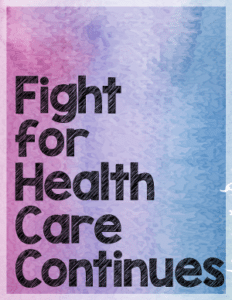 Cody Flack and Sara Ann Makenzie were long denied Medicaid coverage for gender-affirming care in their home state of Wisconsin. They were denied coverage because Wisconsin is one of ten states with a policy on the books that categorically excludes coverage for gender-confirming care for transgender individuals enrolled in Medicaid. However, on July 25, a U.S. district court in Wisconsin prohibited the Wisconsin Department of Health Services from continuing to enforce this policy. The policy violates the nondiscrimination provision of the Affordable Care Act (Section 1557) also known as the Health Care Rights Law. Flack and Makenzie were represented by the National Health Law Program; Relman, Dane & Colfax PLLC; and the Wisconsin law firm, McNally Peterson, S.C. Unfortunately, the Trump administration seems poised to undermine the protections of the Health Care Rights Law with a proposed rule expected to be released soon. It is likely that Trump’s actions will gut important protections for the LGBTQ community and women.
Cody Flack and Sara Ann Makenzie were long denied Medicaid coverage for gender-affirming care in their home state of Wisconsin. They were denied coverage because Wisconsin is one of ten states with a policy on the books that categorically excludes coverage for gender-confirming care for transgender individuals enrolled in Medicaid. However, on July 25, a U.S. district court in Wisconsin prohibited the Wisconsin Department of Health Services from continuing to enforce this policy. The policy violates the nondiscrimination provision of the Affordable Care Act (Section 1557) also known as the Health Care Rights Law. Flack and Makenzie were represented by the National Health Law Program; Relman, Dane & Colfax PLLC; and the Wisconsin law firm, McNally Peterson, S.C. Unfortunately, the Trump administration seems poised to undermine the protections of the Health Care Rights Law with a proposed rule expected to be released soon. It is likely that Trump’s actions will gut important protections for the LGBTQ community and women.
The Health Care Rights Law has been in effect since 2010 and the Department of Health and Human Services (HHS) went through a rigorous process in determining how to implement it. HHS first issued a “request for information” seeking input from stakeholders and then a proposed rule. Final regulations interpreting the law were released in 2016. Thousands of individuals submitted comments in support of the proposed regulations. The Health Care Rights Law prohibits discrimination based on race, ethnicity, national origin (including language and immigration status), age, disability, and sex in health care programs and by providers receiving federal funding, the federal government and marketplaces. It is the first-ever federal law to ban sex discrimination in health care. Specifically, the Health Care Rights Law applies to entities including hospitals, clinics, and doctor’s offices; programs run by the federal government, including Medicaid and Medicare; and issuers selling health insurance plans within and outside of the marketplaces.
The Health Care Rights Law is an integral and necessary step in creating a health care system where no one is denied care because of who they are. Before the ACA, women were charged more than men for insurance or were denied coverage for necessary services, such as maternity care and contraception. Twenty-eight percent of transgender individuals have postponed medical care due to discrimination. People of color continue to face bias and discrimination in health care settings. Because individuals may be part of multiple protected classes and may face discrimination because they belong to one or more of these classes, the Health Care Rights Law reaches intersectional discrimination. For example, the Health Care Rights Law recognizes that a Black woman could face discrimination on the basis of both race and sex. For this reason and others, we need to ensure that the Trump administration does not strip the Health Care Rights Law of the meaningful protections it provides to our communities. If the administration is successful in doing so, many of our communities who struggle to access care will face greater obstacles to get the care they need.
We owe it to Flack and Makenzie to continue fighting for laws that protect us, like the Health Care Rights Law. We must remain committed to the work ahead to protect access to health care, including reproductive health care, as we confront a terrifying future where our civil rights and reproductive rights may be gutted by a more conservative Supreme Court. Regardless of how grim our reality may be, we will continue to fight to preserve our rights. In the coming days, you will hear from NHeLP on how you can fight for the Health Care Rights Law.

